英语学习策略调查问卷
小学生英语调查问卷
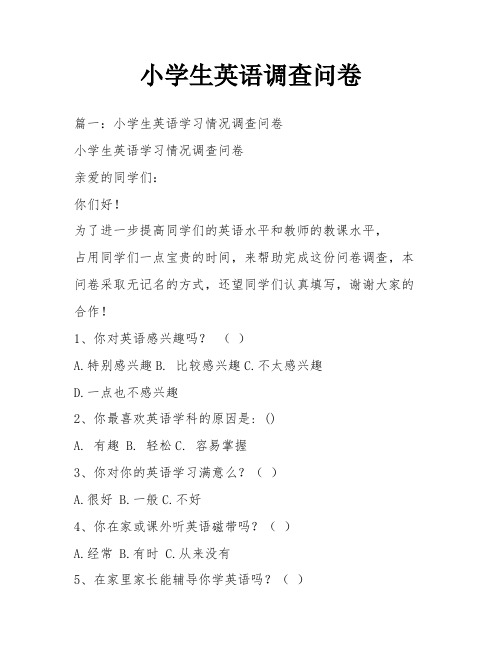
小学生英语调查问卷篇一:小学生英语学习情况调查问卷小学生英语学习情况调查问卷亲爱的同学们:你们好!为了进一步提高同学们的英语水平和教师的教课水平,占用同学们一点宝贵的时间,来帮助完成这份问卷调查,本问卷采取无记名的方式,还望同学们认真填写,谢谢大家的合作!1、你对英语感兴趣吗?()A.特别感兴趣B. 比较感兴趣C.不太感兴趣D.一点也不感兴趣2、你最喜欢英语学科的原因是: ()A. 有趣B. 轻松C. 容易掌握3、你对你的英语学习满意么?()A.很好B.一般C.不好4、你在家或课外听英语磁带吗?()A.经常B.有时C.从来没有5、在家里家长能辅导你学英语吗?()A.能B.不能6、在学英语中,你遇到的主要困难是什么?()A.听力B. 口语C.写作D.阅读E.语法7、在英语课堂上,你经常回答问题吗?()A. 经常B. 有时C.很少D.从不爱发言8、学习中遇到困难,你会怎么样?()A.主动请教老师B.请教同学C.自己查有关资料,参考书目D.不请教任何人,不会就不会9、你觉得学英语的目的是什么?()A.为将来更好的学习打好基础B. 为了应付考试C.为了出国D. 为了老师和父母10、在学习中,你以什么方式记忆最有效?()A.活学活用B.死记硬背C.只看不写D.只写不看E.多听录音F.边读边写G.其他方式11、你经常以什么样的学习方式学习?()A.课前预习B.课堂认真听讲C.课后认真复习D.自学12、你喜欢老师布置的作业依次是()A.听课文磁带B.背单词和句子D.做练习或练习卷 E. 和同学一起编对话F.其他13、你觉得自己在英语中最好的是 ()A.听力B.口头表达C.书面能力14、你觉得自己在英语中较差的是 ()A.听力B.口头表达C.书面能力15、你最喜欢的测试方式是 ()A.卷面B.口头C.创设情景进行测试16、你希望老师加强 ( )训练.A.听力B.口头C.书面17、你对你的英语老师满意吗?()A.非常满意B. 满意C. 较满意D.不满意18、你愿意与老师经常交流学习英语的体会吗?()A.愿意B.不愿意19、课堂上,你愿意参加什么形式的英语活动?21、老师应如何改进教学,你的建议是:问卷到此结束,再次感谢同学们的积极配合!教育研究方法专业:学号篇二:小学生英语学习兴趣调查问卷小学生学习英语兴趣的调查问卷年级:姓名:亲爱的同学:你好!本问卷是为改进教学而设计的,你的回答不会对你的学习和生活造成任何影响,你可以轻松作答。
听力策略调查表

Appendix问卷调查第一部分:个人信息性别:__________________ 年龄:__________________ 年级:__________________ 专业:__________________第二部分:英语听力学习策略使用问卷调查表本问卷旨在调查湘南学院临床专业学生在使用自主学习资源时英语听力策略的使用状况。
为确保本调查数据真实有效,请同学们务必在仔细思考后如实填写。
本调查所采集的一切信息只用于学术研究。
谢谢大家的合作!问卷设计基于听力学习策略的使用,请在A、B、C、D、E 五个选项中,选择一个最能如实描述你听力理解活动的选项,答案无关对错,请根据自己个人的实际学习情况而不是你的想法或者其他人的做法选择,不要漏选或多选!1.我为自己制定了合适的课外听力学习计划。
A.从不B.偶尔C.有时D.经常E.总是2.我制定了阶段性听力训练目标,如本学年经过努力,能够听懂慢速的VOA节目,或中速的英文访谈类节目等。
A.从不B.偶尔C.有时D.经常E.总是3.选择适合自己的听力水平材料来做课外学习,比如英语广播、英文电影电视节目。
A.从不B.偶尔C.有时D.经常E.总是4.喜欢和同学或者朋友一起进行听力训练,如一起选定材料,对听力过程进行交流等等。
A.从不B.偶尔C.有时D.经常E.总是5.经常思考有关听力学习方面的知识,如听力过程分几个步骤,影响自己听力的因素等等。
A.从不B.偶尔C.有时D.经常E.总是6.在平时的学习过程中,我注意积累有关语音语调方面的知识,比如连读、爆破、重音弱读、同化、语调升降来帮助提高听力。
A.从不B.偶尔C.有时D.经常E.总是7.我常把能够与的一些语言现象如句子结构、表达方式和汉语进行对比,找出异同,并积累一些中英有明显差异的习惯表达,以此帮助自己更好更快地理解所听内容。
A.从不B.偶尔C.有时D.经常E.总是8.我有意识地通过英语交际来模仿听力中出现的词句内容,并以此进一步挺高英语听力理解。
初中英语词汇学习策略问卷调查表

初中英语词汇学习策略问卷调查表
请根据以下问题认真填写,以帮助我们了解学生学习英语词汇的策略和需求。
基本信息
1.姓名:_____________________
2.年级:_____________________
3.性别:_____________________
词汇学习习惯
4.你每天学习英语词汇的时间大约是多少?
–[ ] 小于30分钟
–[ ] 30分钟到1小时
–[ ] 超过1小时
5.你使用哪些方式进行英语词汇学习?(可多选)
–[ ] 背单词软件
–[ ] 背单词书
–[ ] 听写
–[ ] 语境记忆法
–[ ] 其他,请列举:____________________
6.你觉得哪种学习方式对你记忆词汇更有效?请简要说明理由。
词汇学习困难
7.你在学习英语词汇时最大的困难是什么?(可多选)
–[ ] 记忆量大
–[ ] 单词拼写困难
–[ ] 记忆单词容易遗忘
–[ ] 难以理解单词意义
–[ ] 其他,请列举:____________________
8.你有尝试过哪些方法来克服词汇学习困难?请简要说明效果。
词汇学习计划
9.你有制定过词汇学习计划吗?如果有,请简要描述你的计划内容和执行情况。
建议与需求
10.你认为学校应该如何帮助学生更有效地学习英语词汇?
11.你希望学校提供哪些支持或资源来帮助你学习英语词汇?
其他意见
请在下方留下你对英语词汇学习的任何其他建议或想法:感谢你的认真填写!。
艺术类中职学生英语学习策略问卷调查报告
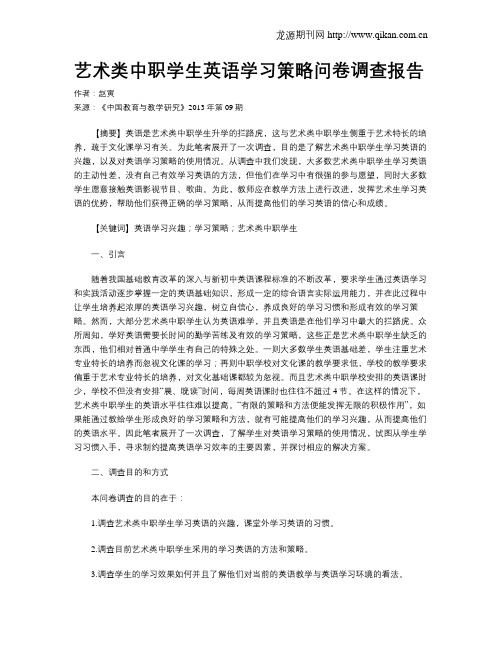
艺术类中职学生英语学习策略问卷调查报告作者:赵寅来源:《中国教育与教学研究》2013年第09期【摘要】英语是艺术类中职学生升学的拦路虎,这与艺术类中职学生侧重于艺术特长的培养,疏于文化课学习有关。
为此笔者展开了一次调查,目的是了解艺术类中职学生学习英语的兴趣,以及对英语学习策略的使用情况。
从调查中我们发现,大多数艺术类中职学生学习英语的主动性差,没有自己有效学习英语的方法,但他们在学习中有很强的参与愿望,同时大多数学生愿意接触英语影视节目、歌曲。
为此,教师应在教学方法上进行改进,发挥艺术生学习英语的优势,帮助他们获得正确的学习策略,从而提高他们的学习英语的信心和成绩。
【关键词】英语学习兴趣;学习策略;艺术类中职学生一、引言随着我国基础教育改革的深入与新初中英语课程标准的不断改革,要求学生通过英语学习和实践活动逐步掌握一定的英语基础知识,形成一定的综合语言实际运用能力,并在此过程中让学生培养起浓厚的英语学习兴趣,树立自信心,养成良好的学习习惯和形成有效的学习策略。
然而,大部分艺术类中职学生认为英语难学,并且英语是在他们学习中最大的拦路虎。
众所周知,学好英语需要长时间的勤学苦练及有效的学习策略,这些正是艺术类中职学生缺乏的东西,他们相对普通中学学生有自己的特殊之处。
一则大多数学生英语基础差,学生注重艺术专业特长的培养而忽视文化课的学习;再则中职学校对文化课的教学要求低,学校的教学要求偏重于艺术专业特长的培养,对文化基础课都较为忽视。
而且艺术类中职学校安排的英语课时少,学校不但没有安排“晨、晚读”时间,每周英语课时也往往不超过4节。
在这样的情况下,艺术类中职学生的英语水平往往难以提高。
“有限的策略和方法便能发挥无限的积极作用”,如果能通过教给学生形成良好的学习策略和方法,就有可能提高他们的学习兴趣,从而提高他们的英语水平。
因此笔者展开了一次调查,了解学生对英语学习策略的使用情况,试图从学生学习习惯入手,寻求制约提高英语学习效率的主要因素,并探讨相应的解决方案。
高职高专院校英语学习情况调查问卷

高职高专院校英语专业在校生英语学习情况调查问卷亲爱的同学:您好!我们正在进行一项关于高职高专院校英语专业学生英语学习情况的调査。
本调查旨在了解同学们的英语学习情况,对于问卷信息采取严格保密措施,您的回答将为我们的研究提供宝贵的事实依据。
请您按您的实际情况回答即可,答案无对错之分,您尽可放心填写。
谢谢您的合作!请在下面相关项目下选择(除特别说明外均为单选),如选择“其他”则请用文字进一步说明:Ⅰ.个人信息您的性别:□男生□女生您的年级:□一年级学生□二年级学生□三年级学生Ⅱ.英语学习动机1、您愿意学习英语吗?A. 愿意B.一般C.不得不学D. 不愿意2、您学习英语的动机是:A.掌握技能B.个人爱好C.找份好工作D.考英语证书E.应付学校考试F.其他3、您的英语证书目标是:A.应用能力A级B.应用能力B级C.四级D.六级E. 无证书目标4、您认为下列哪一种英语技能更重要:A. 听B. 说C. 读D. 写E. 译F. 综合应用Ⅲ.英语学习策略1、您学习英语采取的主要学习策略是:A. 背单词、课文B. 大量做考题C. 大量阅读D. 经常听说E. 其他2、您每周早晨或傍晚朗读英语的次数:A. 7次或以上B. 6次C. 5次D.4次E. 3次F. 2次G. 0次3、您经常背诵课文或课文段落吗?A. 经常B. 一般C. 偶尔D. 从不Ⅳ.英语学习“听说读写”的调查1、您经常写英文日记、周记、作文、信函和email吗?A. 经常B. 一般C. 偶尔D. 从不2、您经常听英语广播、录音、看英语电视和电影吗?A. 经常B. 一般C. 偶尔D. 从不3、您经常阅读英语课外读物吗?A. 经常B. 一般C. 偶尔D. 从不4、您在课堂上经常积极发言和练习吗?A. 经常B. 一般C. 偶尔D. 从不5、您在课堂上经常练习英语口语吗?A. 经常B. 一般C. 偶尔D. 从不6、您常用哪些方式记忆单词?A. 大声朗读B. 边读边写C. 联系上下文D. 背词汇手册E. 其他7、您喜欢哪种学习方式?A. 课前预习B. 课后复习C. 按老师的计划学习D. 无准备和复习8、您认为网络资源是否有助于英语学习?A. 很有帮助B. 有些帮助C. 没有帮助D. 没用过Ⅴ.教材认同1、您认为目前的教材是否符合您的学习需要?A. 非常符合B. 符合C. 不符合D. 教材名称2、您是否同意教材中突出实用性阅读和写作(如说明书、技术规范等)有助于提高英语应用能力?A.完全同意B. 同意C. 不同意D. 无所谓3、您是否同意教材中适当加入人文社科内容和故事有助于提高英语学习兴趣?A.完全同意B. 同意C. 不同意D. 无所谓4、您认为现有教材中听说部分比例是否合理?A.合理B. 偏少C. 偏多D. 不清楚5、您认为目前主教材的练习难度如何?A.一般B. 比较容易C. 比较难D. 适中6、认为目前主教材的编排形式如何:A.生动活泼B. 一般C. 比较枯燥D. 不清楚7、您最喜欢哪一部分教学内容:A.听力B. 写作C. 课文讲解D. 语法E. 口语F. 其他Ⅵ.教学状况满意度1、您对目前的英语教学状况满意吗?A.很满意B. 比较满意C. 不满意D. 无所谓2、您对英语教学最不满意的是:A.教材B. 教学方法C. 教师素质D. 教学条件E. 其他3、您最喜欢的教学模式是:A.教师讲解为主B. 自主学习为主C. 师生互动D. 网络教学为主E. 其他4、您认为网络学习资源有助于英语学习吗?A.非常有B. 有C. 一般D. 没有E. 不知道5、您对高职高专院校英语教学有哪些意见和建议?6、您对英语课有什么期待或者建议?问卷到此结束,谢谢您的合作!。
关于大学生学习英语情况的调查问卷

关于大学生学习英语情况的调查问卷调查者:一、调查背景高等教育是国际竞争力的重要组成局部,培养能满足社会、经济、科技、文化等各个领域需要的高质量人才是高等教育的重要任务。
而外语,特别是英语不仅仅是人们交流和沟通的工具,更重要的它还是国际竞争的武器。
笔者了解到人才市场对大学生的英语水平的要求越来越高,为了对大学生学习英语的态度与策略有个全面、系统的了解,笔者所在的课题组对大学生进展了抽样调查,取得了大量翔实的第一手资料。
通过对这些资料的分析,了解了大学生学习英语的态度与策略的现状,发现了其中存在的问题,并有针对性地提出思考和建议,希望对高校的英语教学有所参考。
二、调查的目的本次调查主要想了解各地大学生英语学习状况――学习兴趣、学习方法、学习态度等,通过对这些情况的分析与总结,认清大学生英语学习中的障碍以及需要我们〔特别是我校学生〕改善和提高的方面,积极创造有利于学生学习英语的外部环境,使英语学习与过级考试不再是一项难题。
三、调查的具体情况第1题你的性别?[单项选择题]在183份有效问卷中,男性50人,占总人数的27.32%;女性133人,占总数的72.68%,间接与财院男女比例3:7吻合了。
第2题你读大几了?[单项选择题]选项小计比例大一10054.64%大二6837.16%大三137.1%大四2 1.09%此题有效填写人次183本次调查中,被调查者大局部为大一的同学,共100人占54.64%,其次为大二的学生,共68人占37.16%,有少量大三的学生13人填了此问卷。
总体呈大一的学生比拟积极承受问卷调查,大二的其次,大三的微量,大四的几乎不再关心这个问题。
原因分析:大一、大二的学生受到英语课程和英语等级考试的要求,与英语有着直接的联系或间接的关联。
第3题你是英语专业吗?[单项选择题]调查显示,超90%的学生为非英语专业的,这也比拟符合我们学校不同专业学生的情况,财经类学校非英语专业的人占多数,英语类专业的学生毕竟是少数。
英语学习问卷调查
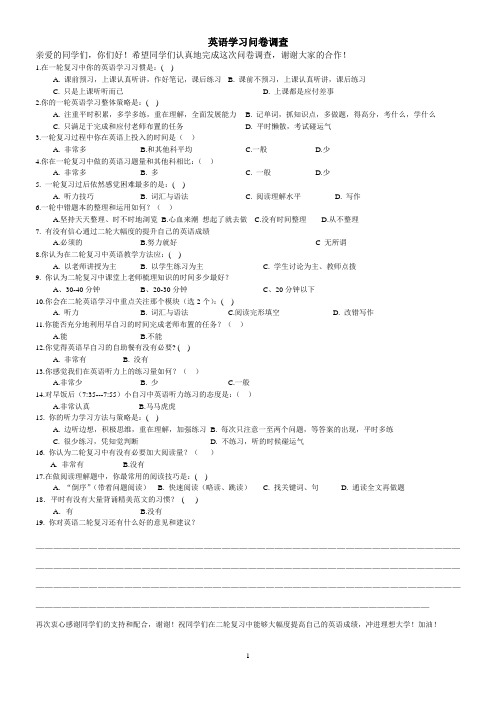
英语学习问卷调查亲爱的同学们,你们好!希望同学们认真地完成这次问卷调查,谢谢大家的合作!1.在一轮复习中你的英语学习习惯是:( )A. 课前预习,上课认真听讲,作好笔记,课后练习B. 课前不预习,上课认真听讲,课后练习C. 只是上课听听而已D. 上课都是应付差事2.你的一轮英语学习整体策略是:( )A. 注重平时积累,多学多练,重在理解,全面发展能力B. 记单词,抓知识点,多做题,得高分,考什么,学什么C. 只满足于完成和应付老师布置的任务D. 平时懒散,考试碰运气3.一轮复习过程中你在英语上投入的时间是()A. 非常多B.和其他科平均C.一般D.少4.你在一轮复习中做的英语习题量和其他科相比:()A. 非常多B. 多C. 一般D.少5. 一轮复习过后依然感觉困难最多的是:( )A. 听力技巧B. 词汇与语法C. 阅读理解水平D. 写作6.一轮中错题本的整理和运用如何?()A.坚持天天整理、时不时地浏览B.心血来潮想起了就去做C.没有时间整理D.从不整理7. 有没有信心通过二轮大幅度的提升自己的英语成绩A.必须的B.努力就好 C 无所谓8.你认为在二轮复习中英语教学方法应:( )A. 以老师讲授为主B. 以学生练习为主C. 学生讨论为主、教师点拨9. 你认为二轮复习中课堂上老师梳理知识的时间多少最好?A、30-40分钟B、20-30分钟C、20分钟以下10.你会在二轮英语学习中重点关注那个模块(选2个):( )A. 听力B. 词汇与语法C.阅读完形填空D. 改错写作11.你能否充分地利用早自习的时间完成老师布置的任务?()A.能B.不能12.你觉得英语早自习的自助餐有没有必要? ( )A. 非常有B. 没有13.你感觉我们在英语听力上的练习量如何?()A.非常少B. 少C.一般14.对早饭后(7:35---7:55)小自习中英语听力练习的态度是:()A.非常认真B.马马虎虎15. 你的听力学习方法与策略是:( )A. 边听边想,积极思维,重在理解,加强练习B. 每次只注意一至两个问题,等答案的出现,平时多练C. 很少练习,凭知觉判断D. 不练习,听的时候碰运气16. 你认为二轮复习中有没有必要加大阅读量?()A. 非常有B.没有17.在做阅读理解题中,你最常用的阅读技巧是:( )A. “倒序”(带着问题阅读)B. 快速阅读(略读、跳读)C. 找关键词、句D. 通读全文再做题18.平时有没有大量背诵精美范文的习惯?( )A.有 B.没有19. 你对英语二轮复习还有什么好的意见和建议?—————————————————————————————————————————————————————————————————————————————————————————————————————————————————————————————————————————————————————————————————————————————————————————————再次衷心感谢同学们的支持和配合,谢谢!祝同学们在二轮复习中能够大幅度提高自己的英语成绩,冲进理想大学!加油!1。
高三英语调查问卷模板
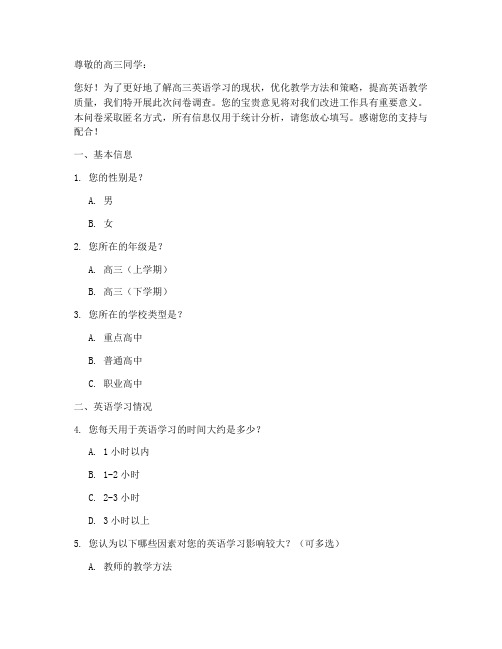
尊敬的高三同学:您好!为了更好地了解高三英语学习的现状,优化教学方法和策略,提高英语教学质量,我们特开展此次问卷调查。
您的宝贵意见将对我们改进工作具有重要意义。
本问卷采取匿名方式,所有信息仅用于统计分析,请您放心填写。
感谢您的支持与配合!一、基本信息1. 您的性别是?A. 男B. 女2. 您所在的年级是?A. 高三(上学期)B. 高三(下学期)3. 您所在的学校类型是?A. 重点高中B. 普通高中C. 职业高中二、英语学习情况4. 您每天用于英语学习的时间大约是多少?A. 1小时以内B. 1-2小时C. 2-3小时D. 3小时以上5. 您认为以下哪些因素对您的英语学习影响较大?(可多选)A. 教师的教学方法B. 同学间的交流与合作C. 家庭环境D. 个人兴趣E. 学习资源F. 其他(请注明):__________6. 您对当前英语课程的设置满意吗?A. 非常满意B. 比较满意C. 一般D. 不太满意E. 非常不满意7. 您认为英语课程中哪些部分对您来说比较困难?(可多选)A. 词汇B. 语法C. 听力D. 阅读E. 写作F. 口语G. 其他(请注明):__________8. 您通常如何提高英语成绩?A. 通过课本和练习册B. 参加辅导班C. 网络资源D. 与同学交流E. 其他(请注明):__________9. 您认为以下哪些学习方法对您来说效果较好?(可多选)A. 制定学习计划B. 集中精力学习C. 多做练习D. 定期复习E. 查找资料F. 其他(请注明):__________三、教学建议10. 您对英语教师的教学方法有何建议?________________________________________________________________________ 11. 您认为学校应如何改进英语教学资源?________________________________________________________________________ 12. 您对英语课程设置有何建议?________________________________________________________________________13. 您对学校英语教学的整体满意度如何?A. 非常满意B. 比较满意C. 一般D. 不太满意E. 非常不满意感谢您抽出宝贵时间填写这份问卷!您的意见和建议对我们改进工作至关重要。
《小学英语对话教学策略的研究》微型课题问卷调查分析
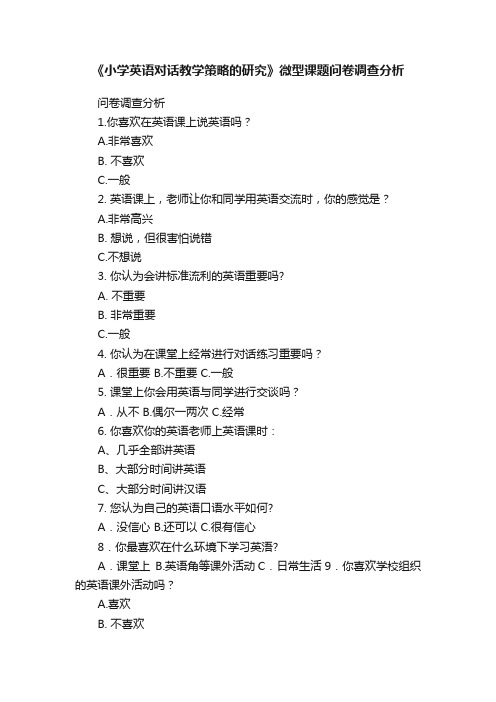
《小学英语对话教学策略的研究》微型课题问卷调查分析问卷调查分析1.你喜欢在英语课上说英语吗?A.非常喜欢B. 不喜欢C.一般2. 英语课上,老师让你和同学用英语交流时,你的感觉是?A.非常高兴B. 想说,但很害怕说错C.不想说3. 你认为会讲标准流利的英语重要吗?A. 不重要B. 非常重要C.一般4. 你认为在课堂上经常进行对话练习重要吗?A.很重要 B.不重要 C.一般5. 课堂上你会用英语与同学进行交谈吗?A.从不 B.偶尔一两次 C.经常6. 你喜欢你的英语老师上英语课时:A、几乎全部讲英语B、大部分时间讲英语C、大部分时间讲汉语7. 您认为自己的英语口语水平如何?A.没信心 B.还可以 C.很有信心8.你最喜欢在什么环境下学习英浯?A.课堂上B.英语角等课外活动C.日常生活9.你喜欢学校组织的英语课外活动吗?A.喜欢B. 不喜欢C.一般10.您觉得老师的教学方法有待改进吗?A.需要B.一般C.不需要11.在课外,你是如何学英语的?A.听英语歌曲B.看英文影片C.看英文书报12.你认为学习英语的最大目的是什么?A.考试B.与人交流C.培养兴趣13、在课堂中你喜欢在玩游戏中学习相关内容吗?A.非常喜欢B. 不喜欢C.一般14. 在课堂中你喜欢小组竞赛的学习方式吗?A.非常喜欢B. 不喜欢C.一般15.你认为在学习英语中的最大的困难是什么?A.学习内容多B.不会说C.不会写通过问卷调查我总结如下:喜欢上英语的学生占70%,且女生占85%.学习英语的目的是应付考试,喜欢在英语课上玩游戏,参加各种活动,除了上课说英语,课后从不说英语。
【调研问卷模板】英语词汇学习策略的调查问卷

【调研问卷模板】英语词汇学习策略的调查问卷亲爱的同学们:本问卷是针对英语专业学生在学习词汇方面学习策略的调查,希望通过此问卷,能够了解英语专业学生在词汇学习中的情况,并找出一些行之有效的词汇学习策略,为大家的学习助一臂之力。
请大家根据自身的实际情况做出相应的回答,本调查结果仅供研究参考。
谢谢大家。
1. 您的性别男女2. 您的年级大一大二大三大四大五研究生3. 您的专业英语语言文化英语高级翻译英语教育英日复语英语翻译4. 元认知策略.5.你会制定系统的学习词汇的计划。
效果★★★★★6.你会有意识地去记忆和运用学习中的词汇。
频率★★★★★效果★★★★★7.你会在词汇学习过程中监督和督促自己。
频率★★★★★效果★★★★★8.你会对自己的词汇学习策略进行评价。
频率★★★★★效果★★★★★9. 认知策略.10.你会对遇到的单词有意识的进行分组归类记忆。
频率★★★★★效果★★★★★11.你会对遇到的单词进行使用频率和实用性的判断,并挑选高频常用的单词进行记忆。
频率★★★★★效果★★★★★12.你会使用重复的方法来记忆单词。
频率★★★★★效果★★★★★13.在遇到生词时,你会采取语境法(如阅读英文原著等)来理解词义并且进行记忆。
频率★★★★★14. 你会通过背单词书来扩充词汇量。
频率★★★★★效果★★★★★15.你会通过词根、词缀、词汇搭配等联想记忆法来扩大词汇量。
频率★★★★★效果★★★★★16.你会有意识地在口语交际和写作等方面去学习词汇。
频率★★★★★效果★★★★★17.你在记忆单词的时候,能从语法意义、词汇意义和单词读音方面综合记忆。
频率★★★★★效果★★★★★18. 社会情感策略19. 在学习单词的过程中,你能有意识地去调控自己的情绪。
频率★★★★★效果★★★★★20.你会不断地去寻找学习动力去学习单词。
频率★★★★★效果★★★★★21.你会主动去跟同学交流学到的词汇并相互检测学习效果。
频率★★★★★效果★★★★★。
高职学生英语听力学习策略的问卷调查
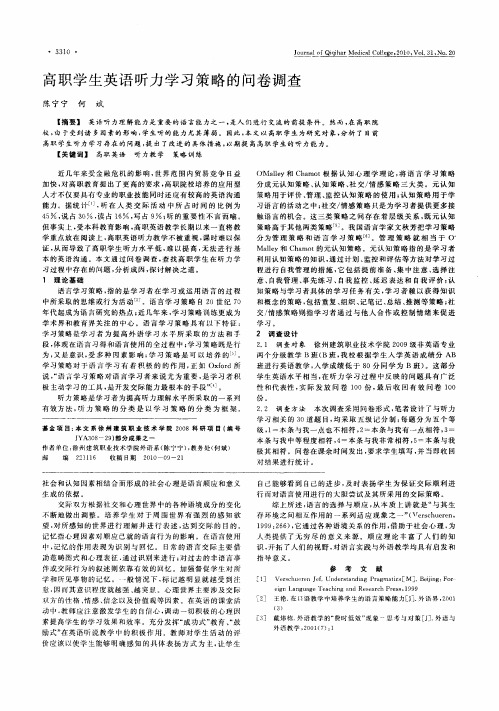
班 进 行 英 语 教 学 , 学 成绩 低 于 8 入 O分 同学 为 B班 ) 。这 部 分 学 生 英 语 水平 相 当 , 听 力 学 习 过 程 中反 映 的 问 题 具 有 广 泛 在
性 和 代 表 性 , 际 发 放 问 卷 10份 , 后 收 回 有 效 问 卷 1 0 实 0 最 0
但 事 实 上 , 本 科 教 育影 响 , 职英 语 教 学 长 期 以来 一 直将 教 受 高 学 重 点 放在 阅读 上 , 职英 语 听 力 教 学 不被 重 视 , 时难 以保 高 课 证 , 而导 致 了高 职 学 生 听 力 水 平 低 , 以 提 高 , 法 进 行 基 从 难 无
本 的英 语 沟通 。本 文 通 过 问卷 调 查 , 找 高 职 学 生 在 听 力 学 查 习过 程 中存 在 的 问题 , 析成 因 , 分 探讨 解 决 之 道 。
1 理 论基 础
程 进 行 自我 管 理 的措 施 , 包 括 提 前 准 备 、 中注 意 、 择 注 它 集 选 意、 自我 管 理 、 先 练 习 、 事 自我 监 控 、 迟 表 达 和 自我 评 价 ; 延 认 知 策 略 与 学 习 者具 体 的学 习 任 务 有 关 , 习 者 赖 以 获 得 知 识 学 和 概 念 的 策略 , 括重 复 、 包 组织 、 笔 记 、 结 、 测 等 策 略 ; 记 总 推 社 交 / 感 策 略 则 指 学 习 者 通 过 与 他 人 合 作 或 控 制 情 绪 来 促 进 情
段 , 现 在 语 言 习得 和语 言使 用 的 全 过 程 中 ; 习 策 略既 是 行 体 学 为 , 是意 识 , 多 种 因 素 影 响 ; 习 策 略 是 可 以 培 养 的 ] 又 受 学 。
二语听力学习策略调查的问卷编制

二语听力学习策略调查的问卷编制摘要:本文针对听力学习策略进行探索,根据oxford和文秋芳的学习策略问卷,编制一套调查问卷,调查中外高校学生二语习得过程中使用的听力策略。
研究包括问卷的整体和细部结构设计,以及问卷的信度和效度测量。
关键词:学习策略;听力;问卷中图分类号:h31文献标识码:a文章编号:1009-0118(2011)-04-0236-02一、oxford和文秋芳的学习策略问卷笔者编制的外语学习听力策略量表立足于文秋芳的学习策略问卷和oxford的语言学习策略量表(strategy inventory for language learning)。
oxford(1989)的语言学习策略量表(v7.0)有两个版本,分别针对把英语作为外语的学生,以及母语为英语且学习新语言的学生。
而文秋芳的学习策略问卷则以中国学生为调查对象,研究中国学生学习英语中所使用的策略。
oxford和文秋芳都利用莱克特量表(likert scale)来对学生使用学习策略的情况进行调查。
但由于两人对语言学习策略采用了不同的划分方式,因此两人的调查量表的设计也相应不同。
oxford把学习策略分成直接策略和间接策略两部分,而两大部分又细分成六大策略。
oxford就是根据这六大策略把整份量表分成六大部分(a-f)。
每个策略都给出六到九个相应的现实行为,通过莱克特五点量表把策略使用情况分为五级,让学生对照自己的情况从五个等级中选择最贴近的一个等级。
文秋芳把学习策略分为管理策略和语言学习策略。
她调查学习策略的问卷分为三个部分:学生的背景情况调查,如何学好英语的看法,以及学习者在学习英语过程中的具体做法。
二、针对听力策略调查的问卷设计(一)问卷设计的根据笔者编制的量表沿用了oxford量表的六大部分和各部分的题量分配,保证六大策略有足够的题目进行考察。
但从微观上看,本研究针对的是听力策略,而oxford和文秋芳调查的是学习策略是普遍运用在听说读写上的。
英语启蒙教育问卷调查
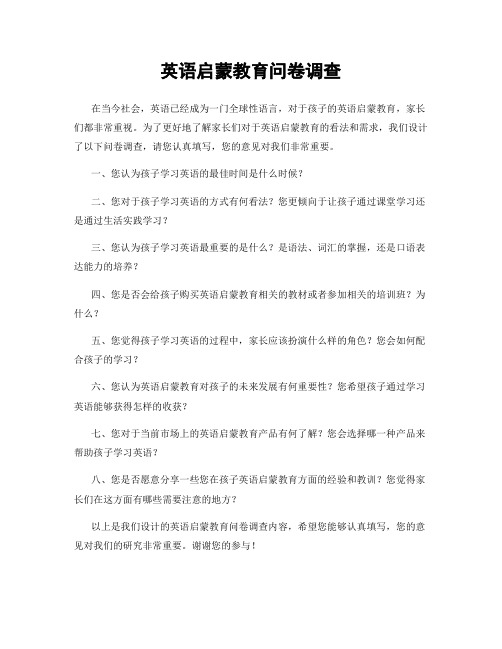
英语启蒙教育问卷调查
在当今社会,英语已经成为一门全球性语言,对于孩子的英语启蒙教育,家长们都非常重视。
为了更好地了解家长们对于英语启蒙教育的看法和需求,我们设计了以下问卷调查,请您认真填写,您的意见对我们非常重要。
一、您认为孩子学习英语的最佳时间是什么时候?
二、您对于孩子学习英语的方式有何看法?您更倾向于让孩子通过课堂学习还是通过生活实践学习?
三、您认为孩子学习英语最重要的是什么?是语法、词汇的掌握,还是口语表达能力的培养?
四、您是否会给孩子购买英语启蒙教育相关的教材或者参加相关的培训班?为什么?
五、您觉得孩子学习英语的过程中,家长应该扮演什么样的角色?您会如何配合孩子的学习?
六、您认为英语启蒙教育对孩子的未来发展有何重要性?您希望孩子通过学习英语能够获得怎样的收获?
七、您对于当前市场上的英语启蒙教育产品有何了解?您会选择哪一种产品来帮助孩子学习英语?
八、您是否愿意分享一些您在孩子英语启蒙教育方面的经验和教训?您觉得家长们在这方面有哪些需要注意的地方?
以上是我们设计的英语启蒙教育问卷调查内容,希望您能够认真填写,您的意见对我们的研究非常重要。
谢谢您的参与!。
师专学生英语学习策略调查

策略
认 知策略
O f d 19) xo ( 90 认为 , 每个策略平均 值可表 示该 策略的使用频率 , 该值越大, 使用频率越高 。 平均得分
4 5 表示“ . —5 几乎时时用此策略” 35 . 为“ ;.—44 常常 用 此策 略” 2 5 . ; . —3 4为 “ 时用 , 时不 用 此 策 有 有 略” 15 . 为“ ;.—24 偶尔用此策略” 1o . 表示“ ;.一14 很 少用或几乎不用此策略” 。下表为师专学生英语学习
策 略使 用 的总体 状况 。
表 1 学习策略使 用的总体状况
13 调 查 目的 . 本次 研 究试 图 回答 以下三 个 问题 :
( )师专学 生使用英语学 习策略 的总体状况如 1 何? () 、 2 文 理科学生在英语学习策略使用方面有何
差异?
些 帮助 。
1 研 究 设 计
11 调查对象 . 本 研究 的调 查 对象 为桂 林师 范高 等专科 学校
性别上 的差 异。
[ 关键词 ] 英语 I 学习策 略 I 学生 师专 [ 中图分类 号] H 1. [ 39 3 文献 标识码] A [ 文章编号 ] lo —77(060-09 -0 o 1 0020 )1 0 2 4
0 引言
学 习策略从广义上讲 , 是指学 习者用来获取 , 贮 存, 提取或使用信息的一套做法或步骤。在语言习得 中, 是指学 习者用来提高 目标语言能力的各项活动。 第二语言学 习策略的研究始于 2 上世纪 7 年代 中 0 0
[ 收稿 日期]o5 9 8 20 一O —1
[ 作者简介] 陈
9 2
()师专学校男、 3 女生在英语学 习策略使用上有 何 差异 ?
英语学习动机量表

英语学习动机量表亲爱的同学:你好!本调查问卷的目的是了解同学们的英语学习动机。
本问卷答案没有对错之分。
不要读出你的答案让别人知道,也不要和同学讨论,请按自己的真实情况选择。
谢谢合作!第一部分:个人信息您的性别:男/女您的专业:理科/文科您的出生地:农村/城市上一次英语考试成绩______________第二部分:英语学习动机调查答题说明:这份英语学习动机量表是为 EFL 学生所设计。
内容是关于英语学习动机的陈述。
请仔细阅读每项陈述。
依据每一项陈述对于你的真实性,把答案 (1, 2, 3, 4, 5) 写在答案分数工作单上。
不要依照你认为自己应该是什么样子或是别人是怎么认为的来回答,而是按符合你的实际情况的程度选择。
这些陈述并没有对或错的标准答案。
在谨慎小心的情况下,快速作答。
如果有问题,马上告知你的老师。
如果要更改答案,将不要的答案打叉,另圈选一个数字。
各数字代表的含义如下:1、完全不符合你的情况; 2、基本上不符合你的情况;3、有点符合你的情况;4、基本符合你的情况;5、完全符合你的情况。
题号完全不符合基本不符合有点符合基本符合完全符合1 我学英语的劲头很大程度上取决于我的学习成绩。
1234 52 我学英语的劲头很大程度上取决于是否喜欢英语老师。
1 234 53 我学英语的劲头很大程度上取决于英语课的质量。
1 2 34 54 我学英语的劲头很大程度上取决于所用的教材。
1 2 3 4 55 我学英语的劲头很大程度上取决于是否喜欢我的英语班。
1 2 3 4 56 学好英语能让我获得成就感。
1 2 3 4 57 我学习英语是因为对英语国家的人以及他们的文化感兴趣。
1 2 3 4 58 我对语言学习有特别的爱好。
1 2 3 4 59 对英语歌曲/电影的爱好使我对英语产生了很大兴趣。
1 2 3 4 510 我学习英语是因为我喜欢这门语言本身。
1 2 3 4 511 对英语文学作品的爱好使我对英语产生了很大兴趣。
英语学习的调查问卷英文版
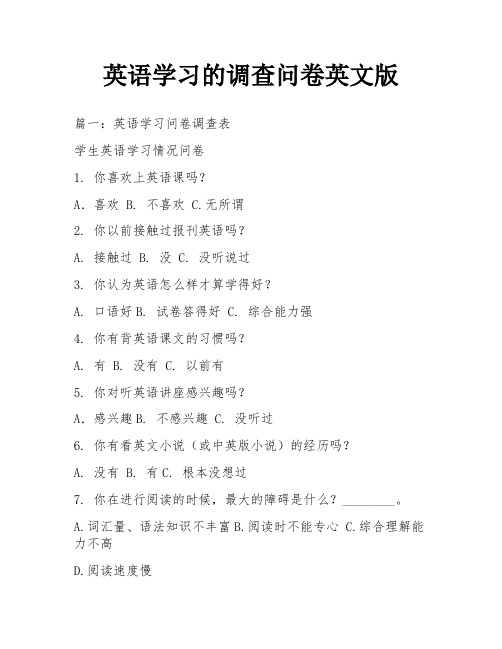
英语学习的调查问卷英文版篇一:英语学习问卷调查表学生英语学习情况问卷1. 你喜欢上英语课吗?A.喜欢 B. 不喜欢 C.无所谓2. 你以前接触过报刊英语吗?A. 接触过B. 没C. 没听说过3. 你认为英语怎么样才算学得好?A. 口语好B. 试卷答得好C. 综合能力强4. 你有背英语课文的习惯吗?A. 有B. 没有C. 以前有5. 你对听英语讲座感兴趣吗?A.感兴趣B. 不感兴趣 C. 没听过6. 你有看英文小说(或中英版小说)的经历吗?A. 没有B. 有C. 根本没想过7. 你在进行阅读的时候,最大的障碍是什么?________。
A.词汇量、语法知识不丰富B.阅读时不能专心C.综合理解能力不高D.阅读速度慢8. 你感兴趣的英语阅读材料的内容是:A.娱乐 B. 文学 C. 社会 D. 校园 E.科技 F. 人物 G. 其它9. 你进行课外阅读训练的目的是什么?__________。
A. 拓展自己的词汇量,提高自己的语言运用能力B. 为了考试得高分C. 为了完成老师布置的作业,不得不做D. 没有训练的必要,我一点都不愿意做10. 当你阅读时,你习惯于:A. 快速默读B. 出声读C. 不出声但发音器官在动D. 边读边用笔划线11. 你所读的英语材料以什么为主?(可多选)A.报刊B.杂志C.原版小说D.《书虫》系列12. 除了教材,你还读其他的英语材料吗?A. 不读B.偶尔C. 只读老师布置的D. 经常读13. 除了看书,你还看英语电影或电视吗?A.不看 B. 偶尔C. 经常看14. 如看英语电影或电视,那么你看的英语电影或电视是何种形式的?A.英语发声且无中文字幕的原版片B.英语发声但有中文字幕的原版片 C.中文发声且有中文字幕的英语片15. 你觉得在英语阅读过程中,最大的障碍是A.生词B.对句子的理解C.对整篇文章的理解16.在你平时做英语阅读训练时,对文段中新的单词或短语会A.立刻查字典B.根据上下文猜测其意思C.直接跳过17.在阅读过程中,你经常会重读吗?A.总是,因为读过一遍后不知道读了什么B.偶尔C.从不18. 你觉得今后在工作岗位中你会用到英语吗?A. 会B. 不会C. 不知道19. 你认为掌握一门外语对今后找工作有没有帮助?A. 有B. 没有C. 不知道20. 请你谈一谈今后怎么样上英语课才能提高你对英语的学习兴趣篇二:关于英语学习的调查问卷关于英语学习的调查问卷 1 您认为最好的学习英语年龄段是几岁?2 您认为您的孩子学几年英语就可以拥有和外国孩子同样的英语会话阅读能力?3您认为怎样的英语学习是最有效的?(1)无意识(2)有意识4 您认为学习英语一定要学习语法吗?5您认为理解并会翻译英语是最好的学习英语方式吗?6您对才能递减法及学习壁障有了解吗?7您会给孩子选择学习英语吗?篇三:英语学习调查问卷你的英语听力如何:A、很好B、好C、一般D、较差在以前的三个学期中你的英语成绩平均多少分?A、80分以上B、70-80C、60-70D、60分以下您每天用多少时间学习英语?A、几乎没有B、少于1小时C、1-2小时D、2小时以上您对学习英语感到?A、轻松 B.、不太困难 C、困难 D、很困难您学习英语的目的是什么?A、社会需求,与国际接轨B、应付考试C、自身幸福满足D、对考研出国的需求您觉得学习英语最难的是什么?A、单词B、语法C、听力D、写作请问您认为英语学得好的原因是什么?A、个人学习方法和策略B、学习环境和条件C、个人天赋D、教师水平您认为提升英语最有效的方式是A、正常英语授课教学B、多考试多做题C、自学D、集中培训您觉得现在的大学英语课程能否帮助你提高英语水平?A、帮助很大B、勉强可以C、没有影响D、课程没什么用您有没有为学习英语制定一个具体的学习计划?A、有,并能很好完成B、有,但是不能坚持到最后C、偶尔,但并未按计划执行D、从不学习英语起始时间A、小学B、初中C、高中D、大学学习英语的动因及目的A、学校课程要求B、未来职业需要C、个人技能培养D、丰富课余生活E、四六级等英语证书考取F、对语言的热爱G、其他您对现有班级英语教学规模的态度A、满意B、较满意C、不太满意D、很不满意本科英语学习中教师授课方式A、教师主讲,无学生提问时间B、讲授与问答结合C、以解答学生提问为主要授课方式D、小组任务式教学您对现有课堂学习方式的态度A、非常喜欢B、喜欢C、一般D、反感您所期望的英语教学方式A、教师讲,学生听B、以学生自学为主,教师只做指导C、完全依靠自学D、其他日常英语学习中所遇到的问题A、单词B、语法C、听力D、口语E、写作F、其他能否运用英语进行基本的会话交流A、非常纯熟B、可以但不流利C、只限简单对话D、完全不行日常英语交流中的问题A、听不懂B、词汇量贫乏C、语言的组织(语法)D、胆怯心理E、无交流对象F、其他希望加强的英语学习项目A、听力与口语B、阅读与写作C、翻译技巧D、专业英语E、其他你认为在英语学习听、说、读、写这四项技能中,哪一项最重要?A、听B、说C、读D、写你认为在英语学习听、说、读、写这四项技能中,哪一项最能体现你的英语水平?A(转载于: 小龙文档网:英语学习的调查问卷英文版)、听B、说C、读 D、写你对学习英语口语的兴趣______.A、很大B、一般C、不太大D、没有你的英语口语如何?A、能基本自由会话B、会说几个句子C、能说几个单词D、几乎不能开口你能听懂老师以英语为主组织的课堂教学呢?A、基本能够B、听懂大部分C、懂一部分D、几乎听不懂你是否练习经常练习口语?A、经常练习B、不常练习,除非是老师的作业C、偶尔说几句D、只在老师上课提问时回答问题,否则不愿意开口你在口语练习中遇到的最大的困难是A、不懂语法B、词汇量太少C、语音语调不好D、初中基础差,发音不好E、胆子小,害怕犯错你本人对自己的口语水平满意吗?A、满意B、比较满意C、不满意D、很不满意你希望通过以下哪种活动方式来提高你的口语水平?A、开展专家讲座B、开展演讲朗诵比赛C、看英文原声电影,唱英文歌D、开展英语角活动E、其它你认为以哪种方式练习最好?A、个人活动B、两人活动C、小组活动D、班团活动你的英语任课老师用英语授课的程度?A、全英B、大部分是英语C、一半中文一半英文D、很少用英语学校是否经常开展诸如英语角、英语演讲比赛之类的活动?。
英语调查问卷模板

英语调查问卷模板引言本调查问卷旨在了解个人对于学习英语的态度、学习方式以及对于英语应用的需求等方面的信息。
请您认真、详细地回答以下问题,以便我们更好地满足您的需求和改善英语学习环境。
感谢您参与此次调查!个人信息请您提供以下个人信息,以便我们对调查数据进行分类和分析:1.姓名:2.年龄:3.性别:英语学习情况1.您是否正在学习英语?–[ ] 是–[ ] 否2.如果您正在学习英语,您学习英语的原因是什么?(可多选)–[ ] 提升英语能力–[ ] 出国留学–[ ] 工作需要–[ ] 兴趣爱好–[ ] 其他(请注明):3.您通常在哪些场景下使用英语?(可多选)–[ ] 学校教学–[ ] 工作交流–[ ] 商务洽谈–[ ] 旅行–[ ] 社交交流–[ ] 其他(请注明):4.您对于英语学习的动力是什么?5.您目前的英语水平如何?–[ ] 初级(基本无英语沟通能力)–[ ] 中级(能进行基本日常英语对话)–[ ] 高级(能流利地使用英语进行交流)6.您最想提升的英语技能是什么?(可多选)–[ ] 听力–[ ] 口语–[ ] 阅读–[ ] 写作–[ ] 其他(请注明):英语学习方式1.您通常通过哪些方式进行英语学习?(可多选)–[ ] 参加英语培训班–[ ] 刷英语学习APP–[ ] 看英语电影/电视剧–[ ] 阅读英语书籍/杂志–[ ] 英语口语实践–[ ] 其他(请注明):2.如果您选择参加英语培训班,您更青睐于传统的面对面授课还是在线教育?–[ ] 面对面授课–[ ] 在线教育–[ ] 未参加过英语培训班3.您对英语学习APP的使用情况如何?–[ ] 使用过,觉得效果一般–[ ] 使用过,觉得效果不错–[ ] 未使用过英语学习需求1.您在学习英语的过程中最大的困扰是什么?请详细描述。
2.您希望在英语学习过程中得到哪方面的帮助?3.如果有一种理想的学习工具,您希望它具备哪些功能或特点?结语非常感谢您花费宝贵的时间参与我们的调查问卷。
英语学习现状调查问卷

英语学习现状调查问卷姓名:(一)学习态度调查1.你对待英语的态度是?A. 非常喜欢B. 喜欢C. 一般D. 不喜欢2.你认为学好英语重要吗?A. 非常重要B. 重要C. 一般D. 不重要3.你为什么学习英语?A.为考大学B.为找工作或将来出国C.喜欢英语D.父母和老师逼迫(二)学习策略调查4. 你在上英语课时能否专心听讲,并理解握所授内容?A. 能B.大多数时候能C.偶尔D.不能5.你会在课前做好预习、课堂记笔记,课后及时复习所学内容吗?A.经常B.有时会C.很少D.从不6.英语老师布置的作业你会按时完成吗?A.都能完成B.大多数时候会C.偶尔交一下D.从不做作业(三)学习主动性调查7.对于课堂练习和考试做错的题,你会最终搞明白吗?A.会B.有时候会C.很少D.从不8. 你能在课堂上积极发言,参与教师的教学活动中去吗?A.总能B.经常C.偶尔D.从不9.课外自主学习英语时间A. 0-30分钟B.30-60分钟C.超过一个小时10.遇到不理解的知识,你是否经常求助于老师或同学?A.经常B.有时C.很少D.从不11.你是否主动与同学交流英语学习经验和学习方法?A.是B.偶尔C.从不(四)归因及意志力调查12.你英语成绩不够理想的主要原因是什么?A.自己不努力B.家长不支持C.教师教学方法不当D.考题太难13.你会因主观原因经常不完成学习英语的计划?A. 是B. 偶尔C. 从不欢迎您的下载,资料仅供参考!致力为企业和个人提供合同协议,策划案计划书,学习资料等等打造全网一站式需求。
高中英语学习调查问卷 (1)

高中英语学习调查问卷随着社会的发展与进步,学习和掌握一门外语成为越来越多的人的一种需求。
在我国,外语教学,特别是英语教学,也随着我国加入世贸组织及国际交流的日益频繁而蓬勃发展。
不过,我国的外语教学长期存有着耗时多、效率低的现象,外语教学观点和方法的陈旧,严重制约着外语教育与教学的发展。
为了全面反映英语教学与学生英语学习的实际情况,为研究性学习和英语教学改革提供必要的依据,特设计调查问卷。
一、基本情况:①年级 A 高一 B 高二 C 高三②性别 A 男 B 女二、自我管理与评价:1、英语学习水平 A 好 B 较好 C 中等 D 较差 E 差3、英语学习有困难时如何获得协助 A 问老师 B 查参考书 C 问同学 D 以上三种办法都用或用其中两种4、是否积极参与英语学习活动 A 积极 B 一般 C 不太积极 D 不积极 E 根本不想参与三、英语学习的非智力因素5、语学习的兴趣 A 很浓 B 较浓 C 一般 D 兴趣不大 E 没有兴趣6、英语语言本身的态度 A 很喜欢 B 喜欢 C 一般 D 不喜欢7、英语学习的动机 A 因喜欢而学 B 为了高考而学 C 既喜欢英语,也是为了高考而学 D 被迫无奈而学8、对学好英语的兴心 A 非常大 B 较大 C 一般 D 不大 E 无9、对英语学习的努力水准 A 非常努力 B 努力 C 一般 D 不太努力 E 根本不努力10、对英语学习的态度 A 积极 B 一般 C 不太积极 D 不积极 E 根本不积极 F 讨厌11、语学习投入的时间与精力(和其他各科相比) A 最多 B 多 C 差不多 D 少12、语学习中是否有团队精神 A 有 B 不太强 C 无四、英语学习方法与策略:13、英语学习习惯A 课前预习,上课认真听讲,作好笔记,课后练习B 课前不预习,上课认真听讲,课后练习C 只上课听听而已D 上课都是应付差事14、英语学习整体策略A 注重平时积累,多学多了练,重在理解,全面发展水平B 记单词,抓知识点,多作题,得高分,考什么,学什么C 只满足于完成和应付老师布置的任务D 平时懒散,考试碰运气15、语法学习方法与策略A 通过具有共同特征的句子去总结语法现象,并能活用,掌握必要的语法知识B 先学习掌握一定的语法知识,再套用C 很少学习语法知识D 根本不懂语法知识五、英语教育教学改革意见征询:下面是一种高中英语教学改革设想,请您做出可行性评价。
- 1、下载文档前请自行甄别文档内容的完整性,平台不提供额外的编辑、内容补充、找答案等附加服务。
- 2、"仅部分预览"的文档,不可在线预览部分如存在完整性等问题,可反馈申请退款(可完整预览的文档不适用该条件!)。
- 3、如文档侵犯您的权益,请联系客服反馈,我们会尽快为您处理(人工客服工作时间:9:00-18:30)。
Strategies Inventory for Language Learning (SILL) Version for Speaking of Other Language Learning EnglishDirections:This form of the Strategy Inventory For Language Learning (SILL) is for students of English as a second or foreign language. You will find statements about learning English. Please read each statement. On the separate Worksheet, write the response (1,2,3, 4,or 5) that tells How true of You this Statement Is.1. Never or almost never true of me2. Usually not true of me3. Somewhat true of me4. usually true of me5. Always or almost true of meNever or almost never true of me means that the statement is very rarely true of you;Usually not true of means that the statement is true less than half the time;Somewhat true of me means the statement is true of you about half the time;Usually true of me means the statement is true more than half the time;Always or almost true of me means the statement is true of you almost always.Answer in terms of How well the statement describes you. Do not answer how you think you should be, or what other people do. There are no right or wrong answers to these statements. Put your answers on the separate Worksheet. Please make no marks to the items. Work as quickly as you can without being careless. This usually takes about 20-30 minutes to complete. If you have any questions, let the teacher know immediately.Part A1. I think of relationship between what I already know and new things I learn in English.2. I use new English words in a sentence so I can remember them.3. I connect the sound of a new English word and an image or picture of the word to help me remember the word.4. I remember a new English word by making a mental picture of a situation in which the word might be used.5. I use rhymes to remember new English words.6. I use flashcards to remember new words.7. I physically act out new English words.8. I review English lessons often.9. I remember new English words or phrases by remembering their location on the page, on the board, or on a street sign.Part B10. I say or write new English words several times.11. I try to talk like native English speakers.12. I practice the sounds of English.13. I use the English words I know in different ways.14. I start conversations in English.15. I watch English language TV shows spoken in English or go to movies spoken in English.16. I read for pleasure in English.17. I write notes, messages, letters, or reports in English.18. I fist skim an English passage (read over the passage quickly), then go back and read carefully.19. I look for words in my own language that are similar to new words in English.20. I try to find patterns in English.21. I find the meaning of an English word by dividing it into parts that I understand.22. I try not to translate word-for-word.23. I make summaries of information that I hear or read in English.Part C24. To understand unfamiliar English words, I make guesses.25. when I can’t think of a word during a conversation in English, I use gestures.26. I make up new words if I do not know the right ones in English.27. I read English without looking up every new word.28. I try to guess what the other person will say next in English.29. if I can’t think of an English word, I use a word or phrase that means the same thing.Part D30. I try to find as many ways as I can to use my English.31. I notice my English mistakes and use that information to help me better.32. I pay attention when someone is speaking English.33. I try to find out how to be a better learner of English.34. I plan my schedule so I will have enough time to study English.35. I look for people I can talk to in English.36. I look for opportunities to read as much as possible in English.37. I have clear goals for improving my English skills.38. I think about my progress in learning English.Part E39. I try to relax whenever I feel afraid of using English.40. I encourage myself to speak English even when I am afraid of making a mistake.41. I give myself a reward or treat when I do well in English.42. I notice if I am tense or nervous when I am studying or using English.43. I write down my feelings in a language learning diary.44. I talk to someone else about how I feel when I am learning English.Part F45. If I don’t understand something in English, I ask the other person to slow down or say it again.46. I ask English speakers to correct me when I talk.47. I practice English with other students.48. I ask for help from English speakers.49. I ask questions in English.50. I try to learn about the culture of English speakers.Strategy inventory for language learningYour name__________ Date______Worksheet for Answering and Scoring1. Write your response to each item (that is 1,2,3,4 or5) in each of the blanks.2. Add up each column. Put the result on the line marked Sum.3. Divide by number under SUM to get the average for each column. Round this average off to the nearest tenth, as in 3.44. Figure out your overall average. To do this, add up all the SUMs for the different parts of the SILL. Then divide by 50.5. When you have finished, your teacher will give you the Profile of Results. Copy your averages (for each part and for the whole SILL) from the Worksheet to the Profile.Part A Part B Part C Part D Part E Part F1.____ 10. ____ 24. ____ 30. ____ 39. ____ 45. ____2.____ 11. ____ 25. ____ 31. ____ 40. ____ 46. ____3.____ 12. ____ 26. ____ 32. ____ 41. ____ 47. ____4.____ 13. ____ 27. ____ 33. ____ 42. ____ 48. ____5.____ 14. ____ 28. ____ 34. ____ 43. ____ 49. ____6.____ 15. ____ 29. ____ 35. ____ 44. ____ 50. ____7.____ 16. ____ 36. ____8.____ 17. ____ 37. ____9.____ 18. ____ 38. ____19. ____20. ____21. ____22. ____23. ____A B C D E F TOTALSUM____ SUM____ SUM____ SUM____ SUM____ SUM____ SUM____/9=_____ /14 =_____ /6=_____ /9=_____ /6 =_____ /6 =_____ /50=_____(Overall Average)Appendix 2学习策略调查问卷说明:阅读下列陈述,然后请你根据自己的实际情况做出选择。
